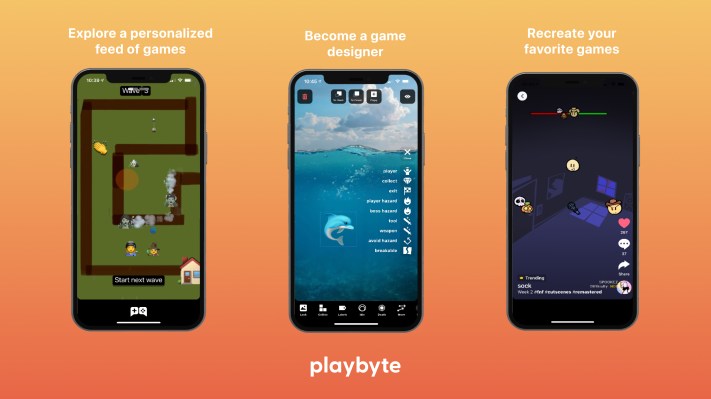Products You May Like
A startup called Playbyte wants to become the TikTok for games. The company’s newly launched iOS app offers tools that allow users to make and share simple games on their phone, as well as a vertically scrollable, fullscreen feed where you can play the games created by others. Also like TikTok, the feed becomes more personalized over time to serve up more of the kinds of games you like to play.
While typically, game creation involves some aspect of coding, Playbyte’s games are created using simple building blocks, emoji and even images from your Camera Roll on your iPhone. The idea is to make building games just another form of self-expression, rather than some introductory, educational experience that’s trying to teach users the basics of coding.
At its core, Playbyte’s game creation is powered by its lightweight 2D game engine built on web frameworks, which lets users create games that can be quickly loaded and played even on slow connections and older devices. After you play a game, you can like and comment using buttons on the right-side of the screen, which also greatly resembles the TikTok look-and-feel. Over time, Playbyte’s feed shows you more of the games you enjoyed as the app leverages its understanding of in-game imagery, tags and descriptions, and other engagement analytics to serve up more games it believes you’ll find compelling.
At launch, users have already made a variety of games using Playbyte’s tools — including simulators, tower defense games, combat challenges, obbys, murder mystery games, and more.
According to Playbyte founder and CEO Kyle Russell — previously of Skydio, Andreessen Horowitz, and (disclosure!) TechCrunch — Playbyte is meant to be a social media app, not just a games app.
“We have this model in our minds for what is required to build a new social media platform,” he says.
What Twitter did for text, Instagram did for photos and TikTok did for video was to combine a constraint with a personalized feed, Russell explains. “Typically. [they started] with a focus on making these experiences really brief…So a short, constrained format and dedicated tools that set you up for success to work within that constrained format,” he adds.
Similarly, Playbyte games have their own set of limitations. In addition to their simplistic nature, the games are limited to five scenes. Thanks to this constraint, a format has emerged where people are making games that have an intro screen where you hit “play,” a story intro, a challenging gameplay section, and then a story outro.
In addition to its easy-to-use game building tools, Playbyte also allows game assets to be reused by other game creators. That means if someone who has more expertise makes a game asset using custom logic or which pieced together multiple components, the rest of the user base can benefit from that work.
“Basically, we want to make it really easy for people who aren’t as ambitious to still feel like productive, creative game makers,” says Russell. “The key to that is going to be if you have an idea — like an image of a game in your mind — you should be able to very quickly search for new assets or piece together other ones you’ve previously saved. And then just drop them in and mix-and-match — almost like Legos — and construct something that’s 90% of what you imagined, without any further configuration on your part,” he says.
In time, Playbyte plans to monetize its feed with brand advertising, perhaps by allowing creators to drop sponsored assets into their games, for instance. It also wants to establish some sort of patronage model at a later point. This could involve either subscriptions or even NFTs of the games, but this would be further down the road.
The startup had originally began as a web app in 2019, but at the end of last year, the team scrapped that plan and rewrote everything as a native iOS app with its own game engine. That app launched on the App Store this week, after previously maxing out TestFlight’s cap of 10,000 users.
Currently, it’s finding traction with younger teenagers who are active on TikTok and other collaborative games, like Roblox, Minecraft, or Fortnite.
“These are young people who feel inspired to build their own games but have been intimidated by the need to learn to code or use other advanced tools, or who simply don’t have a computer at home that would let them access those tools,” notes Russell.
Playbyte is backed by $4 million in pre-seed and seed funding from investors including FirstMark (Rick Heitzmann), Ludlow Ventures (Jonathon Triest and Blake Robbins), Dream Machine (former Editor-in-Chief at TechCrunch, Alexia Bonatsos), and angels such as Fred Ehrsam, co-founder of Coinbase; Nate Mitchell, co-founder of Oculus; Ashita Achuthan, previously of Twitter; and others.
The app is a free download on the App Store.
